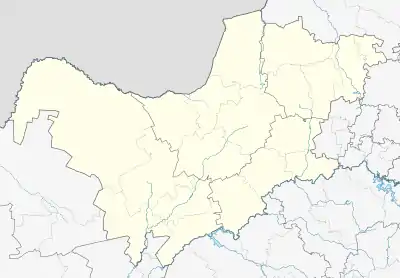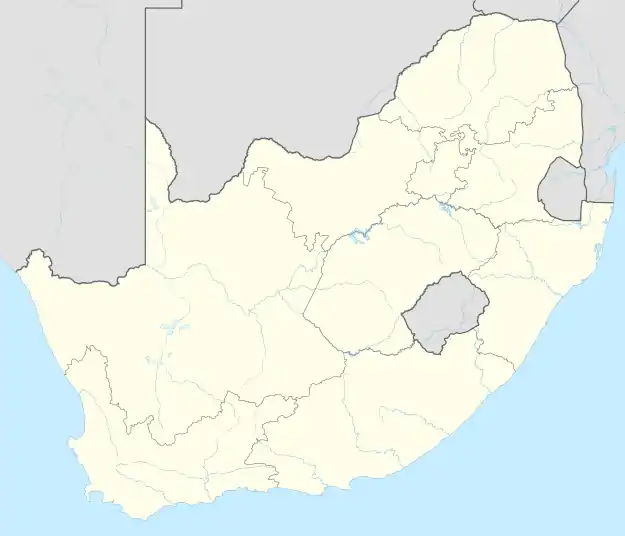Schweizer-Reneke
Schweizer-Reneke, sometimes referred to as Schweizer, is a town in the North West Province of South Africa. It is the administrative centre of Mamusa Local Municipality.[2] It is commonly referred to as SR and the City of Sunflowers.
Schweizer-Reneke
Mamusa "City of sunflowers" | |
|---|---|
 Schweizer-Reneke  Schweizer-Reneke | |
| Coordinates: 27°11′S 25°20′E | |
| Country | South Africa |
| Province | North West |
| District | Dr Ruth Segomotsi Mompati |
| Municipality | Mamusa |
| Area | |
| • Total | 11.53 km2 (4.45 sq mi) |
| Population (2011)[1] | |
| • Total | 2,376 |
| • Density | 210/km2 (530/sq mi) |
| Racial makeup (2011) | |
| • White | 66.1% |
| • Black African | 24.4% |
| • Indian/Asian | 5.1% |
| • Coloured | 2.2% |
| • Other | 2.2% |
| First languages (2011) | |
| • Afrikaans | 74.3% |
| • Tswana | 9.7% |
| • English | 8.8% |
| • Other | 7.2% |
| Time zone | UTC+2 (SAST) |
| Postal code (street) | 2780 |
| Area code | 053 |
History
Schweizer-Reneke was formerly part of the old Transvaal Republic. Founded on 1 October 1888, the town is situated on the banks of the Harts River, with six regional roads exiting the town. The town is named after Captain C.A. Schweizer and Field Cornet C.N. Reyneke. Both men distinguished themselves and were among the ten soldiers killed while storming the stronghold of the Khoekhoe Korana and their chief David Massouw on the nearby Mamusa Hill on 2 December 1885 during an action to put an end to cattle rustling in the area. The remains of the stone fortifications of Chief David Massouw can still be seen on Mamusa Hill.
Economy
The principal crops of the region around Schweizer-Reneke are mainly maize, cotton, groundnuts, sunflower seeds and soybeans. In addition, cattle and sheep farming is practiced in the region on a relatively large scale on the grasslands where the soil is unsuitable for cultivation. Schweizer-Reneke is rich in diamond deposits. This led to large scale private diamond mining in the area.
Wenzel Dam, just north of the town on the Harts River, has been developed into a holiday resort but sadly is now in decay.
Demographics
According to the 2001 census, the town of Schweizer-Reneke proper has a population of 2,601,[3] while the adjacent township of Ipelegeng has a population of 30,053,[4] giving the urban area a total population of 32,654.
91.5% of the people in the urban area described themselves as "Black African", 5.6% as "White", 2.5% as "Coloured", and 0.4% as "Indian or Asian". 69.8% of the people of the town proper described themselves as "White", whereas 98.4% of the people of Ipelegeng township described themselves as "Black African".
85.6% of the people in the urban area speak Tswana as their first language, while 7.3% speak Afrikaans, 3.5% speak Sotho and 1.7% speak Xhosa.
Education
The town has public secondary schools:
- Hoërskool Schweizer Reneke
- Ipelegeng High School
- Itshupeng Secondary School
- Reabetswe Secondary School
It also has public primary schools:
- Laerskool Schweizer Reneke
- Kolong Primary School
- Ikgomotseng Primary School
- Kgatontle Primary School
- Tshwaraganelo Primary School
- Mamusa Primary School
- Charon Primary School
- Roshunville Primary School
Notable people
- Joyce Murray, Canadian politician
- Wynand Claassen, former Springbok rugby captain was born here.
- Ahmed Kathrada a South African politician
- Elisabeth Eybers – Poet
- Irma Stern – Artist
- Essop Pahad, politician
- Pieter Labuschagne, rugby player
Sport
Schweizer Reneke is home to a soccer club "Mamusa United FC" that plays in the provincial football league. There is also a big soccer team formed by the Department of Social Development: Mamusa Service Point. The team boasts with local popular players like Molwantwa Sheriff Lehihi, Kwenzekile Scova Mqweba and Peter Maiyane Kgalapa amongst others.
References
- "Sub-Place Schweizer-Reneke". Census 2011.
- Municipal Demarcation Board : Municipal Profiles 2003 : Contact Information for Mamusa Local Municipality Archived 7 October 2008 at the Wayback Machine Retrieved 15 April 2010
- "Main Place Schweizer-Reneke". Census 2001. Retrieved 2 February 2012.
- "Main Place Ipelegeng". Census 2001. Retrieved 2 February 2012.
.svg.png.webp)
